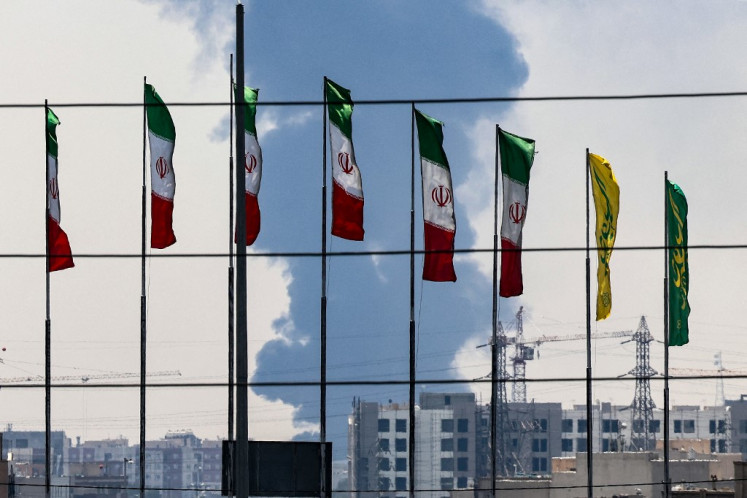Popular Reads
Top Results
Can't find what you're looking for?
View all search resultsPopular Reads
Top Results
Can't find what you're looking for?
View all search resultsGovt warned to avoid 'nationalistic' economic policies
Indonesian policymakers have been advised not to undertake nationalistic economic policies that might further cloud the countryâs investment outlook, especially next year when the country will hold legislative and presidential elections
Change text size
Gift Premium Articles
to Anyone

I
ndonesian policymakers have been advised not to undertake nationalistic economic policies that might further cloud the country's investment outlook, especially next year when the country will hold legislative and presidential elections.
Implementing policies that are driven by nationalistic views could be 'dangerous' for the economy because, in most cases, such a policy stance is not consistent with what is best for people's welfare, warned Ndiamé Diop, World Bank lead economist for Indonesia.
'It is very important to avoid that trap of nationalism,' Diop said on Thursday on the sidelines of the Indonesia Investment Summit 2013 held in Jakarta. 'I haven't seen a lot of countries in the world that have enjoyed success, when they have this sort of attitude in terms of setting their policies.'
Indonesia will hold a general election next year, an event that many fear may trigger regulatory uncertainties for foreign investors.
There is a possibility that some policymakers might pursue their own political agendas and opt to implement populist and nationalistic policies rather than undertake necessary reforms.
Analysts have said that investors may hold back on their investments until a new president is elected in July, next year.
Bank Mandiri has also estimated that the increase in foreign direct investments will fall to between 15 and 18 percent next year, below the 20 percent increase estimated this year and the 26 percent seen in 2012.
Mandiri attributed the fall in foreign direct investments to the global economic uncertainties.
So far the government has proven that it has the guts to implement unpopular policies and undertake reforms. This week, Coordinating Economic Minister Hatta Rajasa ' a seasoned politician who is touted as a potential presidential candidate in 2014 ' revealed a grand plan to loosen the cap on foreign ownership in several industries and open up new sectors to foreign investments.
Hatta said that in the new revised negative investments list (DNI), foreign investors would soon be able to hold 100 percent ownership in airport and seaport management, as well as having higher ownership limits in certain industries, such as pharmaceutical and telecommunications.
While the plan to widen the doors for foreign investors might be seen as un-nationalistic at first, it is actually beneficial as more investments could generate more jobs and create a more competitive environment in the industry, said Diop.
'More competition tends to help consumers in terms of lower prices and better quality products,' he said. 'We are talking about millions of people who will benefit from greater competition, compared to the interests of a few insiders who do not want to open up.'
Analysts say that improving the investment climate is necessary as Indonesia is now seeing a moderation trend in foreign direct investments, whose growth just slumped to a three-year low of 18.4 percent year on year in the third quarter.
'Opening up investments in new sectors should lead to greater foreign direct investment inflows that should help finance the current account deficit, therefore making the balance of payments more sustainable,' Christian de Guzman, a senior analyst for Moody's Investors Service, said on Thursday.
Despite experiencing a slowdown recently, Indonesia's economic growth would bounce back to above 6 percent again this decade, making it an attractive investment hotspot for foreign investors, said British economist Jim O'Neill.
'By 2050, Indonesia could be the sixth-largest economy in the world. It could; this shows how powerful the nation actually is,' said O'Neill, who was famous for coining BRIC ' an acronym that stands for Brazil, Russia, India and China ' and accurately predicting them as the next big thing in the changing landscape of the global economy in the last decade.
Over the last 12 years, Indonesia has seen its gross domestic product (GDP) grow sevenfold to US$897 billion by the end of 2012, O'Neill noted, predicting the economy's size to reach $6,300 billion by the end of 2050.
However, to achieve that, Indonesian policymakers should improve productivity and boost GDP growth capacity from the supply side by accelerating reforms in infrastructure building, technological development and education advancement, he said.









